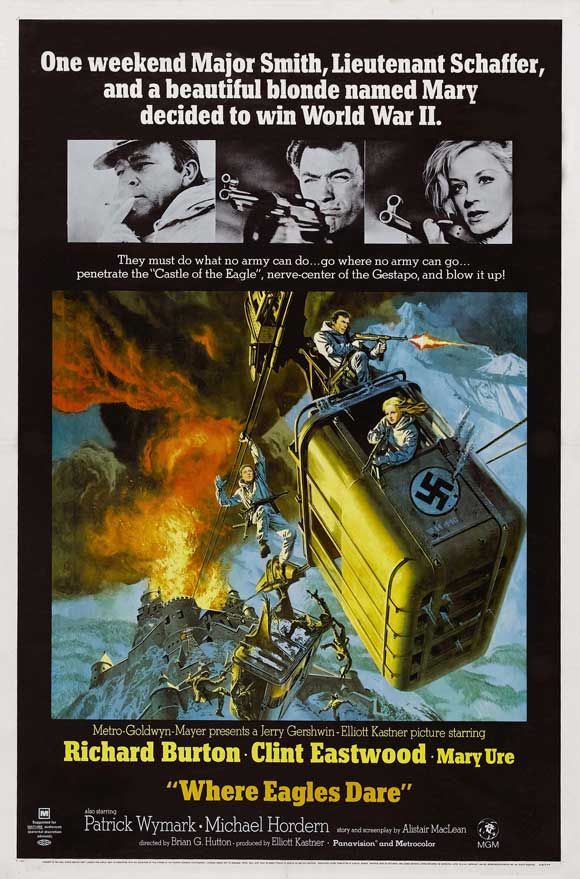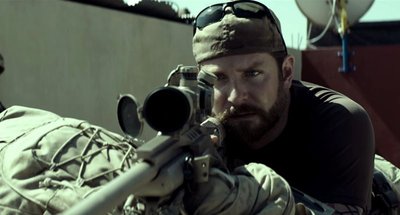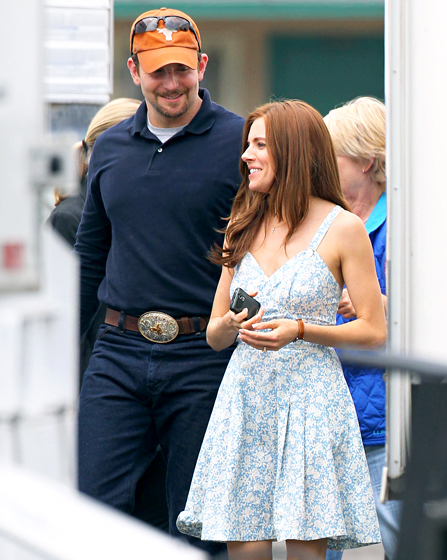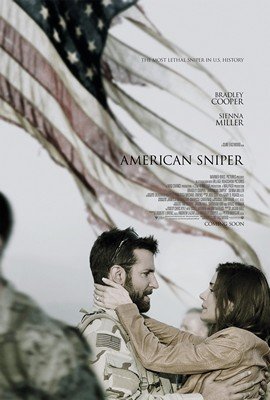Andrew Rostan was a film student before he realized that making comics was his horrible destiny, but he’s never shaken his love of cinema. Every two weeks, he’ll opine on either current pictures or important movies from the past.
It is almost impossible to write this piece without SPOILERS, especially since most people know the story already. But just in case, be warned.
The Parallel
 In 1969, Clint Eastwood starred in a WWII movie called Where Eagles Dare that became one of the year’s biggest hits. Eastwood, whose character has no real personality, spends two hours slaughtering every Nazi that gets in his way…he racks up a higher death count than in any other movie he ever made.
In 1969, Clint Eastwood starred in a WWII movie called Where Eagles Dare that became one of the year’s biggest hits. Eastwood, whose character has no real personality, spends two hours slaughtering every Nazi that gets in his way…he racks up a higher death count than in any other movie he ever made.
Forty-five years later, Clint Eastwood directed a movie called American Sniper that became one of the year’s biggest hits, with six Oscar nominations to boot. American Sniper takes the same type Eastwood played in Where Eagles Dare—the unstoppable American killing machine—and attempts to give him a personality, to understand how men like this who have fought in wars since the days of Homeric legend are formed, how they kill and keep killing, and what happens when the killing stops.
The Great Scene
This is an interesting premise, and there is one moment when Eastwood and screenwriter Jason Hall make it work. At the start of the third act, Chris Kyle (Bradley Cooper) confronts Mustafa (the very impressive Sammy Sheik), his Iraqi counterpart. Kyle and Mustafa, an Olympic gold medalist, are two of a kind; both have shot since childhood, both have wives and young children, and both want to take down the other. This last duel between them and its hellish climax are conveyed in ten minutes of filmmaking so masterful that you’d never believe an 84 year-old man was at the helm.
Yet this scene exemplifies the three major problems that doom American Sniper…
It Takes Serious Liberties With the Truth
Mustafa’s death conflates two separate incidents from Kyle’s autobiography: a brief mention of an Olympic gold medalist turned sniper and Kyle’s hitting one target from a mile away. Hall uses these two snippets to build a personal antagonist to track Kyle throughout the film, and who Kyle hunts on a mission of vengeance for killing his friend Biggles—who actually died in America after a complicated surgery.
Hall deserves credit for ignoring claims Kyle made in the book which were proven false (and have been excessively written about elsewhere), but he also builds a portrait of Kyle as a brilliant but troubled man who agonizes over the deaths of Arabs he kills, Arabs who are killed trying to help, and fellow Americans he could not save, to the point where he is nearly crippled by PTSD. In real life, Kyle gleefully told stories of killing women, referred to Iraqis as savages, and wished he could have killed more. This leads to a bigger problem…
It Conveys the Real Chris Kyle in a Disturbing Way
 American Sniper is a difficult watch because it feeds right into Chris Kyle’s attitudes. This is a movie in which more than one child is brutally murdered. This is a movie in which Iraqis are referred to as “savages” and by multiple obscene words, and the Koran is looked upon with scorn. This is a movie in which Iraqis are portrayed either as steely-eyed, unstoppable butchers, as parents who convince their own children to go out and slaughter Americans, or as cowardly double-crossers who are viewed with contempt even when they try to help the US Army. This is a movie in which Chris Kyle, wearing the logo of ‘The Punisher‘ on his chest, kills so many people one almost becomes desensitized if not for the sheer brutality Eastwood uses in depicting the deaths. It touches on the inhuman.
American Sniper is a difficult watch because it feeds right into Chris Kyle’s attitudes. This is a movie in which more than one child is brutally murdered. This is a movie in which Iraqis are referred to as “savages” and by multiple obscene words, and the Koran is looked upon with scorn. This is a movie in which Iraqis are portrayed either as steely-eyed, unstoppable butchers, as parents who convince their own children to go out and slaughter Americans, or as cowardly double-crossers who are viewed with contempt even when they try to help the US Army. This is a movie in which Chris Kyle, wearing the logo of ‘The Punisher‘ on his chest, kills so many people one almost becomes desensitized if not for the sheer brutality Eastwood uses in depicting the deaths. It touches on the inhuman.
Now, one could argue that a movie about the psychology of a killing machine should depict him as gung-ho for death and see the enemy through his eyes, especially if this film is meant to be, as Eastwood himself claimed, an anti-war picture. The last glaring problem now comes into focus.
It Paints an Overly Simplistic Picture
The United States of America and its soldiers are presented in as much brightness as Iraq is shrouded in darkness. Kyle grows up in a near-idyllic Texas childhood in which he is taught by his parents and pastor that good Christians protect the world from evil and then signs up for the armed forces as his own personal reaction to anti-American terrorism. Then, as Zaid Jilani points out in Salon, “the movie cuts from Kyle watching footage of {9/11} to him serving in Iraq, implying there is some link between the two.”
Kyle’s fellow soldiers are presented as loyal, courageous, and good-humored in the face of all adversity, and those who doubt the cause end up getting killed—the movie blatantly makes this clear during a funeral scene for one of Kyle’s friends, whose widow reads a letter her husband sent agonizing over the brutality. After the funeral, Kyle immediately declares that the man died because of that letter—that this attitude weakened and destroyed him. Compare this to the wounded men Kyle works with in the film’s closing scenes, men who have lost body parts but are still full of spirit and eager to keep shooting things down.
In writing the above passage, I do not want to be misunderstood. I have family members and friends who have served and continue to serve. The spirit, camaraderie, and selflessness they display is a humbling inspiration. But in this film, its contrast with the Iraqi side is so sharp that it’s impossible to keep a “good/evil” divide from setting in, and when one considers the reasons we pushed deeper into the Middle East, the presentation becomes all the more offensive—and, in comparison to Eastwood’s other films about the complexity and futility of violence, downright sad.
Two Bright Spots
 All of this said, I went into American Sniper with an open mind and found three parts I truly liked. One was the aforementioned sniper duel. Another was Bradley Cooper, who cements his true star power with this film. I wish Cooper could have played a fictional character because he is nothing like the Chris Kyle who wrote Sniper. He is charming, empathetic, thoughtful, and goofily romantic in his scenes with Sienna Miller (who in turn captures the tortures of being a military wife). Best of all, Cooper wonderfully conveys Kyle’s salvation in the third act, when he faces his PTSD by working with less fortunate veterans, a noble deed that the film glosses over in favor of more killing.
All of this said, I went into American Sniper with an open mind and found three parts I truly liked. One was the aforementioned sniper duel. Another was Bradley Cooper, who cements his true star power with this film. I wish Cooper could have played a fictional character because he is nothing like the Chris Kyle who wrote Sniper. He is charming, empathetic, thoughtful, and goofily romantic in his scenes with Sienna Miller (who in turn captures the tortures of being a military wife). Best of all, Cooper wonderfully conveys Kyle’s salvation in the third act, when he faces his PTSD by working with less fortunate veterans, a noble deed that the film glosses over in favor of more killing.
Finally, while American Sniper may be tied with The Imitation Game as my least-favorite Best Picture nominee this year, it has the best closing credits of them all. Eastwood shows real footage of people lining the freeways of Texas and making a pilgrimage to Kyle’s memorial at the Cowboys’ stadium, all set to a beautiful composition called “The Funeral” which Ennio Morricone wrote for a long-forgotten 1965 Spaghetti Western. Eastwood shows a picture of the real Chris and Taya Kyle over the final bars…and then there is dead silence for the rest of the credits. In these soft, reflective moments, I was reminded of the truly brave men and women who went to fight in the quagmire of the Middle East and paid the ultimate sacrifice, and I genuinely wept for them and what was lost to America. In these few minutes, I felt something much stronger and more important than what the past two hours had shown me.
Photos from Wikipedia, Us Magazine, and Raw Story.





